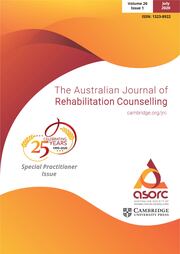Article contents
Rehabilitation Counselling: The Quest for Professional Relevance
Published online by Cambridge University Press: 23 February 2012
Abstract
The global community is experiencing widespread and rapid changes to labour-force participation with increasing expectations of flexible and highly adaptable skill sets. Workers can expect demands to acquire new, and augment existing, competencies as an integral part of the labour contract. Continuing education, professional development, augmentation of competencies and lifelong learning are the occupational mantras of the millennium. If these are the expectations of those already in the workforce, what then do support professionals expect for their clients, such as rehabilitation counsellors who have considerable skills in facilitating the re-entry of clients to the work-force? This paper examines several questions of continuing skilling and provides a set of recommendations with relevance to contemporary professional practice.
- Type
- Articles
- Information
- The Australian Journal of Rehabilitation Counselling , Volume 9 , Issue 2 , January 2003 , pp. 130 - 136
- Copyright
- Copyright © Cambridge University Press 2003
References
- 1
- Cited by




